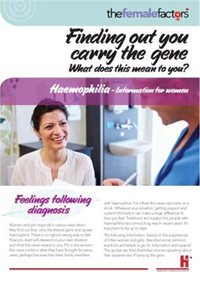CHERYL ELLIS
Cheryl Ellis is Vice-President, Haemophilia Foundation Western Australia and has mild haemophilia A
How are local Foundations exploring peer support for women and what can we learn from their experiences?
The importance of peer support for women affected by bleeding disorders was a key finding in HFA’s consultation for The Female Factors Project. Often feeling isolated and as though they are the only ones with their experiences, women have found connecting and sharing stories to be immensely valuable and empowering.
The local Foundation activities to connect and support women are a concrete way of making a difference for women. HFA is also including personal stories from Australian women with the evidence-based information in all The Female Factors education materials.
This report from Haemophilia Foundation Western Australia (HFWA) is the second in a series about local peer support for women from Australian State and Territory Foundations.
I remember very clearly being told by a junior registrar that our beautiful nine-month-old son had haemophilia. He, my husband and I were in a post-operative ward at the children’s hospital, surrounded by other family members. This all came about because my son had an unexplained swollen knee. He had just started crawling, and his knee blew up like a balloon one day. Off we had rushed to the GP, who sent us straight to the Emergency Department at the children’s hospital, as he thought it was a possible joint infection. After the orthopaedic surgeon washed out his knee (there was a blood clot in the knee, but no infection) the surgical wound kept bleeding. Blood tests revealed that our son had severe haemophilia A.
I look back now and see most of that time as a blur. We had no previous family history, but I knew what the registrar was telling me since I’m a registered nurse. Hearing the words, “Your son has a severe bleeding disorder” felt like a nightmare that I couldn’t wake up from, for a long time. Eighteen months later, we had another son who also has severe haemophilia A. Having seventeen and sixteen-year-old sons who both have bleeding disorders somehow made it easier, since they are treated the same.
Once we emerged through the ups and downs of bleeds, clinic appointments, infusaports (small devices surgically placed under the skin on their chest to infuse clotting factor treatment), high temperatures, inhibitors, learning to intravenously cannulate and more, my thoughts turned to the consequences for myself. I was genetically tested and found to be a carrier of the haemophilia A gene, but also I have factor VIII levels of 24% (as per my current ABDR card), which means I have mild haemophilia.
I decided that I would like to use my powers for good and joined the HFWA committee in 2005. I’m currently Vice President of HFWA, and am a firm believer that social networks and supports are vital for women (and families) to thrive, particularly when a chronic, complex and potentially life-threatening medical condition is thrown into the works.
Our Women with Inherited Bleeding Disorder Group (WWIBD) meetings are Perth metro-based events provided by HFWA to allow women and girls affected by an inherited bleeding disorder to come together in a relaxed and enjoyable setting. HFWA hold them approximately every three months and usually as a Sunday morning breakfast. Occasionally we mix it up a little and have afternoon (high) tea or lunch. Our WWIBD meetings are usually attended by anywhere from ten to twenty women, and feedback we have received include how enjoyable, thought-provoking and beneficial the meetings have been in the past. One of our committee members and a regular attendee to our meetings has commented that the more inclusive names of the women’s meetings really encourages women with von Willebrand disorder and other bleeding disorders than haemophilia to participate.
Our meetings provide opportunities to discuss individual experiences and issues important to us. There are many common subjects of discussion, such as how we came to find out our bleeding status and history, approaching doctors and medical staff for assistance in the past and currently, the problems faced when talking to medical staff who don’t understand bleeding disorders, our children and their health, travelling with bleeding disorders and other events such as the family camp and how fantastic they are. The discussions are often not lead or instructed by anyone but evolve and grow as the conversations move around the table.
Some crucial points that have emerged from the women’s group meetings are the importance of recognizing our own bleeding symptoms, being aware of our own factor levels and, if necessary, having a treatment plan in place.

Educational information such as the Finding Out You Carry the Gene and A Snapshot of Bleeding Disorders in Females booklets are great resources we use to provide a starting point for information when we and other women in our families are identified as carrying the haemophilia gene and want to seek assistance prior to starting a family or when planning procedures, and how to access services at the Haemophilia Treatment Centre. HFWA provided the brochures to our members through a mailout with our newsletters, and emailed links to access the PDFs from HFWA’s website. I also take copies of these brochures with me to the women’s meetings.
Our youth group, parent/family meetings and family camps also provide girls and women with opportunities to take part in fun activities and meet other people and families in similar situations.
Haemophilia Foundation Australia acknowledges the Traditional Owners and Custodians of Country throughout Australia, the land, waters and community where we walk, live, meet and work. We pay our respects to Elders past and present and extend that respect to all Aboriginal and Torres Strait Islander peoples.
Sign up for the latest news, events and our free National Haemophilia magazine